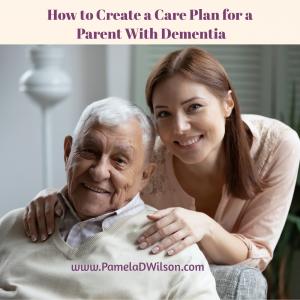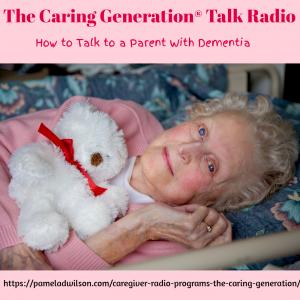Caregiving: How to Create A Care Plan for Elderly Parents or a Spouse with Dementia
Caring for an elder with memory loss is an emotional journey of grieving losses, understanding the wishes of a parent or spouse, and planning for care needs.
GOLDEN, CO, USA, April 21, 2021 /EINPresswire.com/ -- A diagnosis of Alzheimer’s or dementia is life-changing. The importance of planning for future care cannot be underestimated.
Couples in spousal relationships have a built-in caregiver with a healthy spouse. Even still the healthy spouse may need support for dementia care from adult children as the disease progresses. Older adults who are single, divorced, or widowed, called solo agers, face greater challenges to create a plan of care with trusted friends, adult children, and others.
Confirming a Memory Loss Diagnosis Begins the Care Planning Process
Confirming a memory loss diagnosis is the first step to creating a care plan. According to research, chronic diseases and proteins in the brain that result in a diagnosis of dementia or Alzheimer’s disease begin ten to twenty years prior to consumers seeking a formal diagnosis.
Primary care physicians are the gateway to a referral to a specialist qualified to diagnose memory loss. These specialists include geriatricians, neurologists, and neuropsychologists. Dementia is an umbrella term for memory loss that includes Alzheimer’s disease, vascular dementia, dementia with Lewy Bodies, Parkinson’s disease dementia, mixed dementia, frontotemporal dementia, Huntington’s Disease, and other chronic conditions that progress to a dementia diagnosis like multiple sclerosis, stroke, and heart disease.
Dementia and Care Planning Education
According to Wilson, an elder care expert, learning about dementia and how memory loss progresses is essential. Care planning involves discussions with the diagnosed person about health care wishes before memory loss progresses and decision making is impaired. For this reason, legal discussions around who will be the medical and financial decision-maker are time-sensitive.
Spouses may choose the healthy spouse to be the legal decision-maker as an agent under power of attorney or guardianship, with an adult child or a friend as the successor decision-maker. Solo agers may appoint friends or a professional fiduciary. The significance of accepting the role of a decision-maker for an individual with memory loss should be carefully considered.
As the disease progresses, twenty-four-hour care will be necessary. The frequency of visits to healthcare providers will grow as well as the number of decisions that have to be made about daily care. Creating a short and long-term care plan when a loved one can clearly express wishes is essential to minimizing doubt within a family and avoiding arguments with healthcare professionals who may pressure the medical decision-maker to make decisions contrary to the wishes of the patient.
Dementia Caregivers Experience Greater Stress
Caregivers of persons with dementia experience greater stress than other family caregivers because of the extent of the disease. In the early stages, persons with dementia may continue to be self-sufficient while experiencing short-term memory gaps that necessitate kindly reminders to take medications, change clothing, or bathe.
Over time safety concerns about leaving an elderly parent or spouse alone at home build because of common fears like forgetting to turn off running water or a stove. For some loved ones with dementia, wandering out of the home and becoming lost is a significant concern. The ability of a spouse or adult child to leave the home to perform errands, grocery shop, or have time alone becomes dependent on having another individual to come to the home to stay with a spouse or parent.
How to Talk to a Spouse or Parent with Dementia
Conversations become more difficult with the progression of memory loss. The ability to remember becomes short and information is lost. Within a matter of seconds, a parent or spouse may repeat a question or become stuck on a desire like wanting to go home—when the person is at home.
In many situations, long-term memory remains intact. A desire to go home may be a desire to return to a childhood home. Individuals may want to see or talk to parents who are dead because of having no recollection that a parent has passed on. It is important for dementia caregivers to recognize and accept that attempts to teach, remind, reorient or reason with a loved one with memory loss will only frustrate the care receiver and the caregiver.
Instead of insisting that a person with dementia live in the present, dementia caregivers must learn to be present with a spouse or parent in their world. The Caring Generation podcast, How to Talk to a Parent With Dementia offers insights on being with loved ones at their level of presence and comprehension.
Dementia Behaviors Can Be Shocking and Challenging
In addition to learning how to respond appropriately to repetitive questioning or perseveration, other behaviors related to the disease may occur that can include refusing care or physical aggression. Family caregivers cannot be expected to know all of the aspects related to caring for persons with dementia. Caregiving for persons with and without dementia is a journey of learning, trial, and error.
All Care Situations Are Different
Decision-making for each care situation regardless of whether the care is related to chronic disease or memory loss is based on recall of past experiences by the caregiver and the care receiver. Even when caregiving experience exists through a similar or recent experience, joining an onsite or online course or support group offers insights to improve care of loved ones.
Caregivers experiencing exhaustion and burnout rarely consider that their level of attention or concentration may be impaired. As a result, the care provided to loved ones may not be optimal or mistakes in care may occur. Consulting with an elder care expert can give caregivers the permission needed to acknowledge and attend to their needs while finding and using other sources of support.
When potential burnout is discussed early in the care planning stages for a parent or spouse with dementia, guilt related to seeking education and outside support can be alleviated. No single caregiver can fully meet the needs of a spouse or a parent day in and day out indefinitely. Everyone—especially caregivers—does a better job when feeling healthy, happy, and supported.
Contact Wilson for more information about caregiver support, resources, consultations, and education. Email Inquiry_For_Pamela@PamelaDWilson.com or call +1 303-810-1816.
P Dombrowski-Wilson
Pamela D. Wilson, Inc.
+1 303-810-1816
email us here
How to Talk to a Parent With Dementia
Legal Disclaimer:
EIN Presswire provides this news content "as is" without warranty of any kind. We do not accept any responsibility or liability for the accuracy, content, images, videos, licenses, completeness, legality, or reliability of the information contained in this article. If you have any complaints or copyright issues related to this article, kindly contact the author above.



